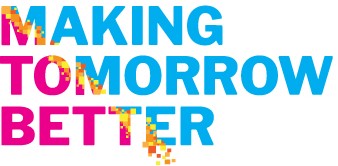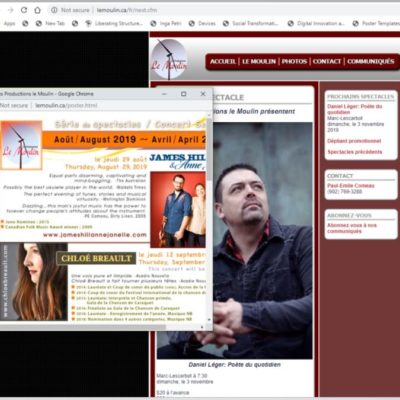Why you need one web page for each event or product
Brochure-ware of old or Single Page Application?
With the popularity of mobile devices and the preference of mobile web users toward scrolling content, Single Page Applications have become more common. In a way, they are similar to some of the first web pages created. A single web page tended to have large amounts of content and navigation was rudimentary. Remember the “brochure” websites from 25 years ago?
Indexing web pages
Today, when arts organizations or festivals create web pages that list multiple shows, search engines and other data crawlers and scrapers are less likely to effectively index your page.
When building or updating a website there are a few things you have to know, including:
- Google doesn’t list your website as whole. Instead Google indexes each page on your site.
- The use of frequently searched keywords (see Traditional Search Engine Optimization matters) can enhance the ranking of your event page in search results or in Google Event Finder.
- Search engines require one authoritative (canonical) master page with all the event information in order to properly index your information. This will impact if and how Google displays your event in Answer Box or in Google Event Finder.
- When you use tags, from meta tags to style tags that are used to identify levels of headings and body text, Google understands your content better. In short, words in a headline are more important than words in body text. This requires using your website’s style sheet, instead of manually adjusting fonts; this works just like the styles in Word processing software.
The problem with listings pages
For a search engine or web crawler, a listings approach makes it difficult to index the page effectively for each event. Simply put, most of the information on the page is not relevant to one artist, or one show. Similarly, the title tag and the description tag – some of the most important pieces of data a search engine takes into account when ranking your web page – are likely generic, rather than keyword-rich.
How one web page for each event benefits you
Web searches lead to the most relevant page on the web based on the keywords searched.
When all the relevant content about a show is put on one web page, we are able to provide a richer, more compelling and specific experience to the human user. Headlines and body text are specific to the artist or show, boosting credibility with the search engine. We can also code the page in order to optimize it for search. For instance, the artist name or show title can be used in the web address, title tag and description tag.
Adding your town, event date, and start time also helps search engines surface your specific events (i.e., What’s on in Calgary tonight; versus Matt Anderson tour). Provide this factual information as plainly as possible, separated out on different lines (not within sentences or a paragraph). Use consistent date and time formats across all your event pages.
Automated scraping of web content is also facilitated when each event has its own web page and factual information in a simple and consistent format as described above.
Next step: Structured data
Structured data is the meta-data (the information about your event) that helps a search engine and other web crawlers and scrapers “read” your content correctly. Google uses schema.org’s common standard for meta-data tags to this end. There are WordPress plug-ins like Yoast or SchemaPro that deliver this today to any web user. Those with non-WordPress websites can refer to Google’s detailed information about how to use structured data. or can consider emerging services such as the Digital Discoverability Program.
Today, structured data for events is becoming much more popular and aids in Google selecting them for display in its answer boxes. In short, Google’s answer boxes and Event Finder are driven by properly structured data, including a dedicated event URL. In order for your event to be featured in Google’s Event Finder, Google requires one event page with all the information – that way, this page may be referenced in Google Event Finder under “More Information”.
Moreover, with the use of Amazon’s Alexa, Apple’s Siri or Google Assistant, structured data will be the only way to enable the return of useful information in the virtual voice assistant’s single answer reality.
Not showing up in these rich results on Google is increasingly problematic for arts organizations, as they risk dropping of the web users radar.
This web page from a volunteer-run presenting organization has several significant problems from the perspective of search engines:
- Show information is difficult to index because the structure of the web page includes very little HTML content.
- “The next show” has two pages, one with only images, including the artists name, and the second with show information. One page would be more effective and using HTML text instead of images would allow Google to read this content.
- The show by Daniel Léger doesn’t have a dedicated web page. Rather the show information is rendered under a generic “/fr/next” URL, a web page that features whatever show is coming up next.
- It does not use its web addresses to highlight artists or shows.
- Basic meta tags (title tag, description tag) are not used to make up for its shortcomings in how the content is rendered through images.
- The event information is limited and ambiguous. “Marc-Lescarbot” is not clearly identified as the venue and the address of this venue or its location within Université Saint-Anne, in Clare, cannot easily be inferred. The time is provided next to the venue name as “7:30”. This can be presumed by human being to mean that the show begins at 7:30 pm. However, there’s no way for a machine to really know for sure that this series of digits even represents a start time, nor to know that this start time is in the evening.
- It doesn’t use structured meta-data to make its event information machine-readable and therefore is not able to be displayed in Google answer boxes.
- Its events page is comprised of an image of its printed brochure or PDF file. None of this content is coded to be machine readable.
Single Page Application and SEO
A Single Page Application (SPA) is a website that loads all of the resources required on the first page load, and then dynamically refreshes content as the web user interacts with the site without ever making full page request.
This makes SAP’s so difficult to index for search engines that they are typically not used when search visibility is required. Workarounds are both labour-intensive (such as creating an actual HTML version of the site), unreliable (if the content between the mirror HTML site and SAP appears too different for a search engine it might be penalized instead of listed), and fraught with maintenance challenges (such as maintaining current content on multiple versions of a website.)
There are a number of other challenges by loading an entire website as a single page, from tracking web history to analytics.
Canonical page
When a website has several URLs (uniform resource locator; akin to a web address for all the elements on a web page) with the same content, search engines can get confused. Google determines which page it considers authoritative. To help them recognize the authoritative source reliably, you can identify the master page using the canonical tag, thus identifying it without ambiguity.





